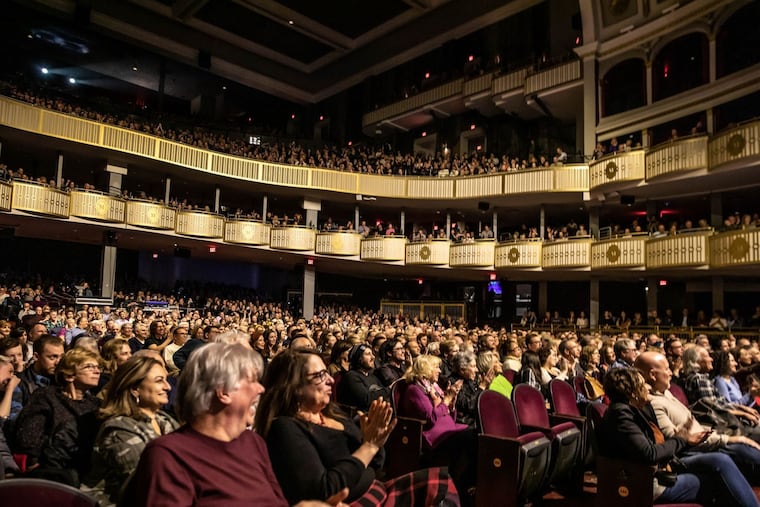Judge denies Philly Pops’ request for order returning it to the Kimmel Center
It was unclear when or where the Philly Pops might perform again.

The judge in the Philly Pops’ antitrust lawsuit against the Kimmel Center has declined to order the Pops’ immediate return to its former home in the arts center, as the group had requested.
In a pretrial hearing Wednesday, the Pops failed to meet the burden of proof for irreparable harm it would suffer if it were not immediately reinstated as a resident of Verizon Hall, U.S. District Court Judge Mia Roberts Perez ruled.
Such an order would have allowed the Pops the right to perform in the Kimmel once again this fall. The case now will either head toward trial or be settled out of court.
“While we are disappointed by the court’s decision today, we are determined to once again perform for our patrons and the community we love,” said the Pops in a statement attributed to president and CEO Karen Corbin. “The Philadelphia Orchestra has made it abundantly clear — both through their repeated actions and their response to the Pops’ lawsuit — that they are absolute in their wrongheaded mission to shut down the Philly Pops. We want to thank our patrons and musicians for their patience and understanding as we work through this unprecedented set of circumstances.”
The Philadelphia Orchestra and Kimmel Center, Inc. on Wednesday expressed appreciation for the court ruling.
“The Philly Pops’ claims lack merit and we remain committed to vigorously defending ourselves in court and pursuing our counterclaims against the Philly Pops for the more than $1 million it owes,” said POKC in a statement. “As we continue to address the Philly Pops’ baseless allegations, we will continue to provide high-quality, diverse programming for audiences and look forward to welcoming the former Philly Pops musicians — the No Name Pops — who are renting the Kimmel Center’s Verizon Hall for performances in October.”
The fledgling pops ensemble organized after the Philly Pops was evicted from the Kimmel, and the American Federation of Musicians filed its own lawsuit against the Pops on behalf of Pops players for nonpayment of broadcast fees for a Christmas show in December 2022.
In its April lawsuit filed in U.S. District Court for Eastern Pennsylvania against POKC, the Pops alleged that the orchestra, after merging with the Kimmel Center, engaged in “unlawful, anticompetitive and predatory conduct” to “eliminate the Philly Pops as a competitor in and monopolize the market for live symphonic popular concert music” in the greater Philadelphia area.
Asked where the Philly Pops would seek to perform in the future, a Pops spokesperson said the group’s board would be considering next steps.
Perez said in her ruling that the bar for issuing a preliminary injunction like the one the Pops was requesting was high. Citing legal precedent, she said that the Pops had failed to provide projections showing how a return to Verizon Hall might trigger charitable contributions. It didn’t show that its former musicians would be willing to perform for the organization again, she said, and did not provide any evidence that ticket buyers — some of whom feel burned after the Pops failed to provide refunds for concerts not performed — would materialize.
Much of Wednesday’s hearing was devoted to the question of whether the Pops had any performing venues available to it other than Verizon Hall. Without access to the hall, the Pops would have to consider filing for bankruptcy, said Pops attorney William DeStefano. Pops board member John J. Meko Jr. testified that Verizon was the only viable performance space for the group for its regular subscription concerts.
Asked by Kimmel lawyer Steven A. Reed whether the Pops would have to shut down if it couldn’t return to Verizon Hall, Meko said:
“I don’t think there’s any way forward without getting back into the Kimmel.”
Reed pointed out that the Pops had performed in other venues, like the Mann Center, and that its own website currently stated that it was the “principal orchestra” of the Met Philadelphia.
Reed led Corbin through testimony and a series of documents showing that the Pops had long been behind on its bills to the Kimmel, and had even received previous notices of default long before the current crisis.
“At some point, enough is enough,” Reed said to the court in his closing argument.
DeStefano argued that a return to Verizon Hall would “reopen the tap” of revenue, and that previously the Pops had been allowed by the Kimmel to stretch out debt payments beyond their due date.
Perez responded: “Isn’t that why we’re here?”